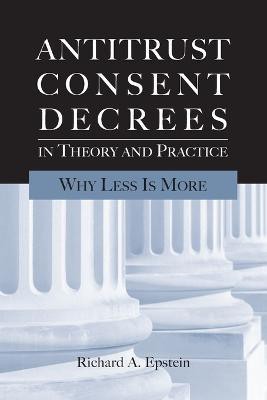Antitrust Consent Decrees in Theory and Practice(English, Paperback, Epstein Richard A)
Quick Overview
Product Price Comparison
For over one hundred years, the antitrust consent decree has been a major weapon in the federal enforcement of antitrust laws. In Antitrust Consent Decrees in Theory and Practice, Richard A. Epstein undertakes the first systematic study of their use and effectiveness from both a historical and analytical perspective. Epstein observes how differences in antitrust philosophy can shape the kinds of comprehensive settlements that the government will seek and the courts will grant. Epstein takes issue with aggressive antitrust enforcement strategies that seek to use government power to fundamentally alter industry structures or the business practices of regulated firms, in some instances leading to their breakup. To explain the perils of that approach, Epstein carefully examines the history of consent decree litigation, culminating in detailed studies of the AT&T breakup and the government antitrust actions against Microsoft. Applying modern theories of antitrust analysis, Epstein's central thesis is that bold antitrust remedies that are not tightly tied to a defensible theory of wrongful conduct often prove counterproductive.Such measures typically force firms to adopt business practices and structural reorganizations that substantially impede their ability to compete effectively in the marketplace. The disparate fates of AT&T and Microsoft are the result of a major and fruitful shift in thinking about the use and limits on the antitrust laws in a wide variety of industrial contexts. Antitrust Consent Decrees in Theory and Practice will be of interest to any reader who is concerned with the larger implications of the government regulation of law and business. Epstein brings nearly forty years of personal knowledge and experience to this matter. Written in a clear and nontechnical style, this book should prove an invaluable resource to any student of regulation and economic policy, as well as lawyers and policymakers concerned with antitrust litigation.


